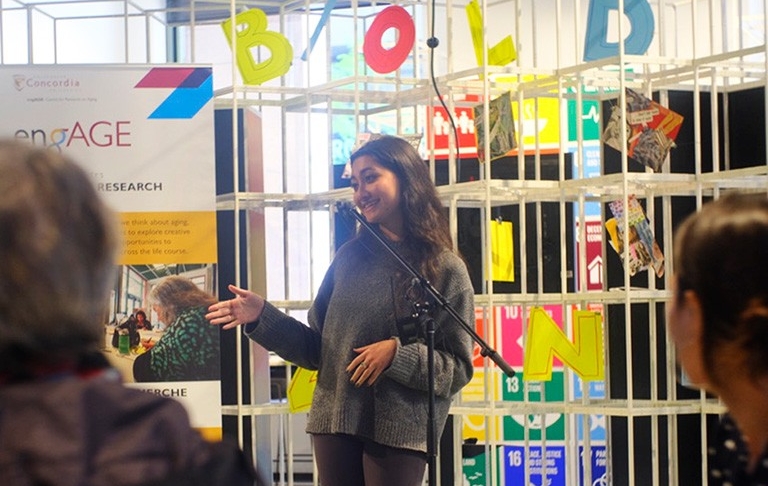How Emma Chen found her research focus — and a community — at Concordia
 “I’m trying to harness the benefits of ballet to increase physical-activity levels and create a fun fall-prevention program.”
“I’m trying to harness the benefits of ballet to increase physical-activity levels and create a fun fall-prevention program.”
As a teen, Emma Chen, BSc 21, MSc 23, took elite modern-dance training at a New York City conservatory. But after sustaining injuries, she decided to study exercise science instead.
“I saw it as a way of being still close to dance without becoming a professional dancer,” she says.
Today, she is advancing dance-based approaches to reducing the risk of falls among seniors.
Roughly one in three older adults sustain a fall each year. These accidents often result in prolonged hospitalization, a loss of independence and even death.
Exercise can reduce the risk, however, which is where Chen’s research comes in.
“Dancers have great body awareness, balance and strength,” she explained in a pitch that won her Concordia’s three-minute thesis competition (3MT) in March 2024.
“I’m trying to harness the benefits of ballet to increase physical-activity levels and create a fun fall-prevention program.”
As part of her MSc in Health and Exercise Science at Concordia, Chen provided ballet-inspired classes twice a week to older women and assessed the impact on their postural stability and dynamic balance.
By delivering these classes remotely, she overcame health, transportation and geographical barriers, reaching people across the provinces of Quebec and Ontario.
Her project earned her financial support from the Fonds de recherche du Québec and the Canadian Institutes of Health Research.
 Chen helps advance dance-based approaches to reducing the risk of falls among seniors.
Chen helps advance dance-based approaches to reducing the risk of falls among seniors.
Now a PhD researcher, Chen is continuing to investigate dance as a way of preventing falls. She also sits on the board of Concordia’s engAGE: Centre for Research on Aging, where one aspect of her role is to ensure connections between students and members of the wider community.
For example, Chen plans to extend her aging-focused dance sessions into Montreal organizations so that she will no longer be the only instructor.
In the process, she has been polishing her French skills. Although her parents originally hail from Montreal, she grew up in Kingston, Ontario, with limited exposure to French from Belgian relatives and school.
“I had a bit of a foundation, but I wasn’t very good at it before I came to Montreal,” she says. “I wouldn’t have been able to teach in French like I do now.”
Chen explains that a lot of the instructors and students in Concordia’s Department of Health, Kinesiology and Applied Physiology are native French speakers, which has given her plenty of chances to practice her second language.
A healthy academic community needs students coming in from elsewhere, she argues, because the scientific enterprise relies on exchanges between people from different backgrounds.
“That’s the same reason why scientific conferences are useful,” she points out. “You hear people from all over the world speaking about how their systems work. And you might say, ‘Oh! I never thought of that as an option.’”
For students themselves, coming from out-of-province or from another country is a challenging yet fun experience, according to Chen.
“When you’re experiencing cultural differences and you’re not around your family, you end up leaning on others in the same situation,” she says. “You need each other, so you become good friends and build a community.”
Discover how you can support future Concordia scholars from the rest of Canada.

